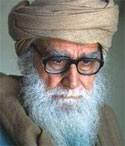
By Maulana Wahiduddin Khan for New Age Islam
07 October 2016
In various parts of the world today, Muslims are engaged in acts of violence. If they are told to stop this, they claim: “We are only doing what the Prophet of Islam commanded us to.” In this regard, they cite a hadith that orders the believers to rectify a wrong:
He who amongst you sees something wrong should try to rectify it with the help of his hand; and if he has not strength enough to do so, then he should do it with his tongue, and if he has not strength enough to do so, then he should abhor it in his heart, and that is the least of faith. (Sahih Muslim)
This hadith is cited by some people in order to claim sanction for violence, although actually the hadith does not mention violence. This hadith speaks about reforming or rectifying a wrong. If one does not have the ability to rectify the wrong, then the hadith says, one should speak out against it. The hadith certainly does not say that on seeing something wrong one must begin to unleash violence against people or resort to suicide-bombing. One cannot derive sanction for violent activities from this hadith.
This hadith talks about Taghayyur-E Munkar, which means rectifying or remedying a wrong. The Arabic word Taghayyur means ‘replacement’. Hence, in the above hadith, the word Taghayyur means replacing a condition of evil or wrong with a condition that is not evil or wrong. In other words, this hadith ordains the reforming of a certain condition, not engaging in conflict and causing destruction.
The well-known Arabic dictionary Lisan al-Arab explains the word Taghayyur as follows: ‘Taghayyur means to change something. That is, to change it into something that it had not been earlier.’ (5/40) The eleventh-century Muslim scholar of Quranic exegesis and the Arabic language, Raghib al-Isfahani (d.1108) has written a dictionary of Quranic terms, Al-Mufradat fi Gharib al-Quran, in which he explains the word Taghayyur thus: “It is said ‘I changed (Taghayyur) my house’, which means that you changed the construction of your house and constructed it anew.”
Today, in various parts of the world violence is taking place in the name of jihad. This so-called ‘sacred violence’ is being led by self-styled Muslim leaders. And in this, almost all Muslims are involved in some way or the other, because those Muslims who are not directly engaged in this violence are silent about it. From the Islamic point of view, this silence of theirs is tantamount to indirect involvement. Hence, according to Islamic principles, the entire Muslim Ummah will be considered to be engaged in this violence—some people directly, others indirectly.
Facts tell us that this violence has produced no positive results at all. There is only one result that is following everywhere from this violence— and that is, destruction and nothing constructive at all. In this situation, then, one can, without any doubt whatsoever, say that these violent acts are definitely not Taghayyur-e-Munkaror rectification of any wrong. Rectifying a wrong means changing an undesirable situation and bringing in a desirable situation in its place. In contrast, any action that proves counterproductive is definitely destruction, and in no way an Islamically-desirable action.
A negative reaction to an unwanted situation leads to violence and conflict. It is notTaghayyur-e-Munkar or rectifying a wrong. Rectifying a wrong is a completely positive action. It is undertaken to bring about reform in a given situation, not to make the situation even worse. Reforming a situation requires that one analyze it with an unbiased mind and then undertake efforts to reform it through constructive planning. Those who act contrary to this are, without any doubt, unleashing destruction and not carrying out reform.
New Age Islam, Islam Online, Islamic Website, African Muslim News, Arab World News, South Asia News, Indian Muslim News, World Muslim News, Women in Islam, Islamic Feminism, Arab Women, Women In Arab, Islamophobia in America, Muslim Women in West, Islam Women and Feminism




 Moderate Islamist here
Moderate Islamist here


0 comments:
Post a Comment